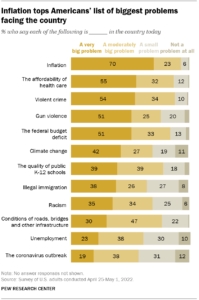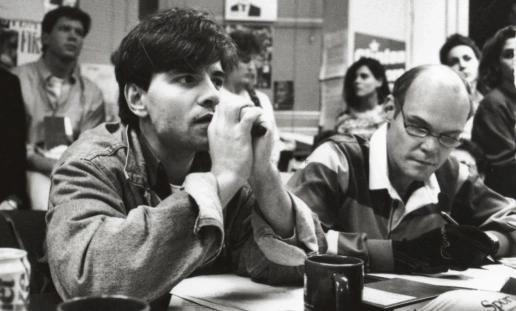Think what you will about the raging culture wars, but that’s not the major driver of public opinion today any more than it was when Bill Clinton first ran for president in 1992.
That’s when Clinton campaign analyst James Carville pushed a laser focus on messaging with the simple mantra, “It’s the economy, stupid!” At the time, the nation faced an economic recession that got pinned on George H.W. Bush’s administration and cost him reelection.
Thirty years later, with inflation at the highest levels in years, even the heightened battle over public education and racism can’t top economic concerns among voters. Or as Pew Research summarized: “The public views inflation as the top problem facing the United States — and no other concern comes close.”
There are some caveats to this simple summary, however, beginning with significant differences of priorities for Republicans and Democrats. Across the nation as a whole, 70% of American adults say inflation is “a very big problem,” followed by the affordability of health care (55%) and the threat of violent crime (54%). Only 6% of Americans don’t believe inflation is a problem at all.
 Republicans and Republican-leaning voters are the most likely to cite inflation as their top concern, clocking in 14 points higher than the general population, at 84%. By comparison, 57% of Democrats and Democratic leaners say the same. Among Democrats, larger shares cite gun violence (70%), the affordability of health care (65%) and climate change (63%) as top concerns.
Republicans and Republican-leaning voters are the most likely to cite inflation as their top concern, clocking in 14 points higher than the general population, at 84%. By comparison, 57% of Democrats and Democratic leaners say the same. Among Democrats, larger shares cite gun violence (70%), the affordability of health care (65%) and climate change (63%) as top concerns.
At the same time, concern about racism is on the decline — despite near-weekly protests, racially motivated murders and the hullabaloo over Critical Race Theory.
Pew reports: “The share of adults who say racism is a very big problem for the country has declined by 10 percentage points since last April, from 45% to 35%. Most of the change has come among Democrats: 49% now view racism as a major problem, down from 67% about a year ago. Republicans’ views are largely unchanged (14% today, 19% then).”
And despite massive unrest in school board elections and efforts to ban books, limit curriculum and muzzle teachers, the “quality of public schools” falls eighth on the ranked list of what’s bothering American as a whole. And surprisingly, there’s only a small gap between Republicans (41%) and Democrats (36%) on this question.
Another economic issue, the affordability of health care, comes in second among the concerns of all Americans, but again there is a wide gap between Democratic views (65%) and Republican views (42%).
Worry about violent crime ranks No. 3, with 54% of all Americans saying they see this as a big problem. The gap between Republicans (60%) and Democrats (47%) is smaller here than in most all other categories.
Gun violence and the federal deficit tie for the No. 4 national concern, with Republicans (69%) far outpacing Democrats (35%) in worry about the deficit and Democrats (70%) far outpacing Republican (27%) in worry about gun violence. Democrats are nearly three times more likely than Republicans to say gun violence is a big problem, and Republicans are twice as likely as Democrats to say the federal deficit is a big problem.
“The share of adults who say racism is a very big problem for the country has declined by 10 percentage points since last April.”
Another notable trend is the drop in the share of Americans who see the coronavirus as a big problem. Just 19% of Americans rate COVID-19 as a current big problem for the country, the lowest ranking among 12 issues in the survey. That’s down 39 points since June 2020, when 58% rated it as a very big problem.
The two major political parties remain deeply divided in their views of climate change and illegal immigration. Pew reports: “Democrats are nearly four times as likely as Republicans to rate climate change as a very big problem (63% vs. 16%). Republicans, by contrast, are far more likely than Democrats to view illegal immigration as a very big problem (65% vs. 19%).”
The Pew Research Center survey was conducted April 25 through May 1 among 5,074 U.S. adults.
Related articles:
Optimism returning to Americans as they see pandemic threat fading, but some sober realities remain
How should Christians respond to rising gas prices in America today? | Opinion by Ellis Orozco

